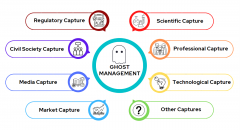
What is Ghost-Management?
“Ghost-management” is the systematic behind-the-scenes efforts and strategies deployed by corporations to shape knowledge, ideas and narratives about specific products, to influence experts by nurturing conflicts of interest, to capture regulation and policymakers, and to shape media and culture in ways that allow maximizing earning-capacity. While academic literature has explored how firms produce wealth, knowledge and information, our research analyzes how firms also spend vast resources to downplay risks, externalize costs and selectively produce ignorance or uncertainty through the dissemination of false, misleading, or contradictory information.
Our research analyzes ghost-management as a central feature of corporate capitalism in specific industrial sectors, such as pharmaceuticals and agro-chemicals. Large corporations not only produce products for the market, they also develop ways to circumvent market competition to increase their earning capacity. Beyond the political economy of production and distribution, we find a political economy of influence constantly attempting to re-shape knowledge and social structures according to specific corporate interests.
In more theoretical terms, we are seeking to understand the nature of capital accumulation in specific sectors when investments aim not only to produce goods, but also to transform social structures through influence and misleading information.
Our research identified 8 different types of strategies through which corporations can capture social and informational structures in ways that are usually legally sanctioned. These strategies of capture are the corporate behaviors that make up the overall construct of “ghost-management”. These categories are: